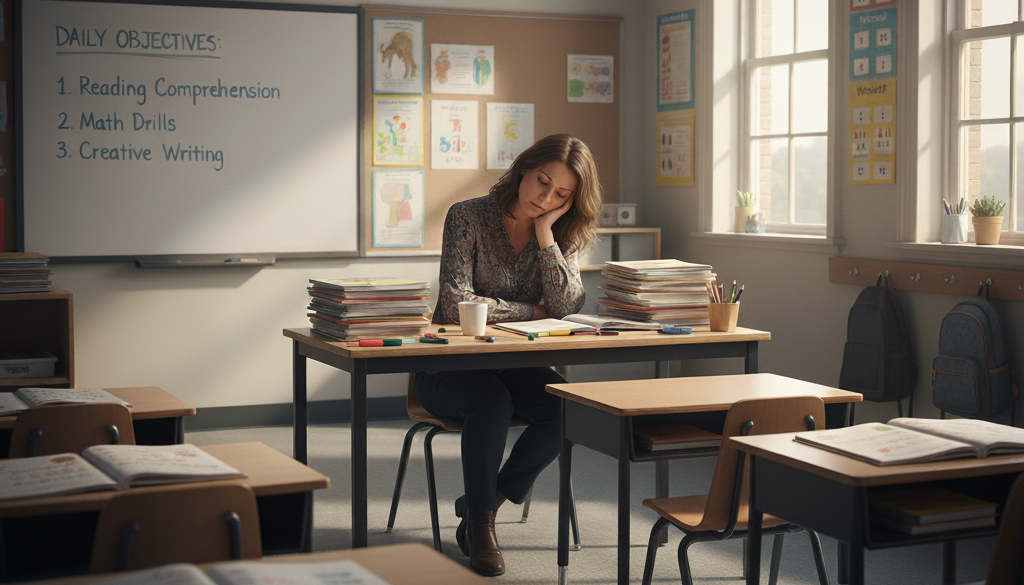Across the UK, schools are experiencing an exodus of teachers – not just new recruits but seasoned, passionate professionals who once saw teaching as a lifelong vocation. For many parents, this trend might feel distant – something playing out in staffrooms and board meetings – but it affects families directly. So why are brilliant teachers leaving the profession every day?
If you’ve noticed more supply teachers, disrupted learning, or low staff morale at your child’s school, you’re witnessing the effects of a deepening crisis. This article explores why teachers are leaving the profession in such large numbers, how it impacts pupils, and what can be done to turn things around.
Work/life balance is a distant dream
Despite what some may believe, teachers don’t finish at 3:30pm. Most work long into the evenings and spend weekends planning lessons, marking books, and preparing for inspections.
Many educators report regularly working 50 to 60 hours per week, far beyond their contracted hours. For teachers with families of their own, this imbalance can be devastating. Important moments are missed, stress levels rise, and burnout becomes inevitable.
Teaching, once a role that allowed for family-friendly flexibility, has become all-consuming. The constant juggling act is driving good people out of the classroom.
Pressure from senior leaders is rising
Schools are under immense pressure to deliver results – and that pressure filters directly down to classroom teachers. Data tracking, pupil progress meetings, and performance reviews have increased in intensity. While accountability is important, many teachers feel micromanaged and mistrusted.
Some describe feeling like “data clerks” rather than educators. The joy of teaching is lost when every lesson must meet a specific rubric, and every child’s progress must be logged, justified, and displayed in spreadsheets.
For early career teachers especially, this kind of pressure can lead to a quick exit from the profession – often before they’ve had a chance to thrive.
Pupil behaviour is getting harder to manage
There’s no denying that pupil behaviour has become more challenging post-Covid. Teachers report higher incidents of defiance, disengagement, and anxiety among students. Some pupils are struggling with unmet SEND needs or trauma, while others simply lack the boundaries that were once reinforced consistently at school and home.
Sadly, the support systems needed to address behaviour – such as teaching assistants, pastoral care teams, and specialist training – are increasingly stretched or non-existent.
Teachers feel unsupported and exposed. The emotional toll of managing frequent disruption, without the tools to make lasting change, wears them down over time.
Reinventing the wheel in planning
Another major frustration is the expectation to constantly “reinvent the wheel” when planning lessons. Instead of working collaboratively with ready-made resources, teachers are often expected to create new schemes of work, differentiated tasks, and assessment tools from scratch.
This duplication of effort is time-consuming and unnecessary. Worse still, it pulls teachers away from what really matters: building relationships with their pupils and responding to their needs in real-time.
There’s a sense that education is chasing trends rather than valuing the professional judgement of those who know their classrooms best.
Lack of respect and recognition
Many teachers feel that the respect once afforded to their profession has eroded. In the media and online, teachers are sometimes portrayed as lazy or overly political. In reality, they’re trying to do an increasingly difficult job under incredibly strained circumstances.
Pay, too, is a factor. While teachers don’t enter the profession for the money, real-terms pay cuts have made it harder to justify staying, especially with rising living costs. When dedication goes unrecognised, even the most committed professionals start to question their path.
Advice for teachers feeling disillusioned
If you’re a teacher reading this and nodding along, you are not alone.
Here are some gentle reminders and suggestions:
- You are not a failure. Leaving teaching is not a personal defeat. Sometimes, stepping away is the healthiest decision. I did exactly this – read my story here.
- Talk about how you feel. Whether it’s with a trusted colleague, a mental health professional, or a supportive friend, sharing helps.
- Explore flexible options. Private tutoring, educational consultancy, or part-time teaching roles can offer more balance and autonomy.
- Set clear boundaries. It’s okay to leave work at work, and not respond to emails after hours.
- Remember your “why.” Even if you do leave, your impact on young people remains. You made a difference.
- And, perhaps most importantly, seek help. The Education Support charity was set up specifically to help teachers and education staff and they have advice and many resources for you.
What this means for parents
For parents, this mass departure of teachers can be worrying. A stable teaching team is vital for consistency, trust, and effective learning. When teachers leave, schools often rely on supply staff or split classes, which disrupts learning and relationships. If you feel your child needs further support outside of school, especially if school is experiencing a high staff turnover or much turbulence, a private tutor can offer an alternative route for consistent learning.
That said, parents can play a role in supporting the profession too:
- Show appreciation. A kind word or thank-you note can go a long way.
- Engage respectfully. Teachers are doing their best. Assume positive intent when discussing concerns.
- Support mental wellbeing. Advocate for better support services in your school community.
- Be a partner. Work collaboratively with teachers to help your child thrive.
Final thoughts
The growing number of teachers leaving the profession is a warning sign that cannot be ignored. Our children deserve a stable, inspiring education – and that can only happen when the adults supporting them are also supported. Prioritising both pupil outcomes and staff wellbeing isn’t a choice between two goals. It’s the foundation of a thriving school community. When we care for our educators, we strengthen the future of our children.











